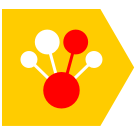Software:Catboost
 | |
| Original author(s) | Andrey Gulin:[1] / Yandex |
|---|---|
| Developer(s) | Yandex and CatBoost Contributors[2] |
| Initial release | July 18, 2017[3][4] |
| Stable release | 0.24.1[5]
/ April 7, 2022 |
| Written in | Python, R, C++, Java |
| Operating system | Linux, macOS, Windows |
| Type | Machine learning |
| License | Apache License 2.0 |
| Website | catboost |
CatBoost[6] is an open-source software library developed by Yandex. It provides a gradient boosting framework which among other features attempts to solve for Categorical features using a permutation driven alternative compared to the classical algorithm.[7] It works on Linux, Windows, macOS, and is available in Python,[8] R,[9] and models built using catboost can be used for predictions in C++, Java,[10] C#, Rust, Core ML, ONNX, and PMML. The source code is licensed under Apache License and available on GitHub.[6]
InfoWorld magazine awarded the library "The best machine learning tools" in 2017.[11] along with Tensorflow, Pytorch, XGBoost and 8 other libraries.
Kaggle listed CatBoost as one of the most frequently used Machine Learning (ML) frameworks in the world. It was listed as the top-8 most frequently used ML framework in the 2020 survey[12] and as the top-7 most frequently used ML framework in the 2021 survey.[13]
As of April 2022, CatBoost is installed about 100000 times per day from PyPI repository[14]
Features
CatBoost has gained popularity compared to other gradient boosting algorithms primarily due to the following features[15]
- Native handling for categorical features[16]
- Fast GPU training[17]
- Visualizations and tools for model and feature analysis
- Using Oblivious Trees or Symmetric Trees for faster execution
- Ordered Boosting to overcome overfitting[7]
History
In 2009 Andrey Gulin, developed MatrixNet, a proprietary gradient boosting library that was used in Yandex to rank search results. Since 2009 MatrixNet has been used in different projects in Yandex, including recommendation systems and weather prediction.
In 2014-2015 Andrey Gulin with a team of researchers has started a new project called Tensornet that was aimed at solving the problem of "how to work with categorical data". It resulted in several proprietary Gradient Boosting libraries with different approaches to handling categorical data.
In 2016 Machine Learning Infrastructure team led by Anna Dorogush started working on Gradient Boosting in Yandex, including Matrixnet and Tensornet. They implemented and open-sourced the next version of Gradient Boosting library called CatBoost, which has support of categorical and text data, GPU training, model analysis, visualisation tools.
CatBoost was open-sourced in July 2017 and is under active development in Yandex and the open-source community.
Application
- JetBrains uses CatBoost for Code Completion[18]
- Cloudflare uses CatBoost for bot detection[19]
- Careem uses CatBoost to predict future destinations of the rides[20]
See also
References
- ↑ "Andrey Gulin - People - Research at Yandex". https://research.yandex.com/people/102811.
- ↑ "Yandex open sources CatBoost, a gradient boosting machine learning library" (in en-US). https://techcrunch.com/2017/07/18/yandex-open-sources-catboost-a-gradient-boosting-machine-learning-librar/.
- ↑ Yegulalp, Serdar (2017-07-18). "Yandex open sources CatBoost machine learning library" (in en). https://www.infoworld.com/article/3209124/yandex-open-sources-catboost-machine-learning-library.html.
- ↑ "Release 0.24.1 · catboost/catboost" (in en). https://github.com/catboost/catboost/releases/tag/v0.24.1.
- ↑ 6.0 6.1 "catboost/catboost". August 30, 2020. https://github.com/catboost/catboost.
- ↑ 7.0 7.1 Prokhorenkova, Liudmila; Gusev, Gleb; Vorobev, Aleksandr; Dorogush, Anna Veronika; Gulin, Andrey (2019-01-20). "CatBoost: unbiased boosting with categorical features". arXiv:1706.09516 [cs.LG].
- ↑ "Python Package Index PYPI: catboost". https://pypi.python.org/pypi/catboost/.
- ↑ "Conda force package catboost-r". https://anaconda.org/conda-forge/r-catboost.
- ↑ "Maven Repository: ai.catboost » catboost-prediction". https://mvnrepository.com/artifact/ai.catboost/catboost-prediction.
- ↑ staff, InfoWorld (27 September 2017). "Bossie Awards 2017: The best machine learning tools". https://www.infoworld.com/article/3228224/bossie-awards-2017-the-best-machine-learning-tools.html.
- ↑ "State of Data Science and Machine Learning 2020". https://www.kaggle.com/kaggle-survey-2020.
- ↑ "State of Data Science and Machine Learning 2021". https://www.kaggle.com/kaggle-survey-2021.
- ↑ "PyPI Stats catboost" (in en-US). https://pypistats.org/packages/catboost.
- ↑ Joseph, Manu (2020-02-29). "The Gradient Boosters V: CatBoost" (in en). https://deep-and-shallow.com/2020/02/29/the-gradient-boosters-v-catboost/.
- ↑ Dorogush, Anna Veronika; Ershov, Vasily; Gulin, Andrey (2018-10-24). "CatBoost: gradient boosting with categorical features support". arXiv:1810.11363 [cs.LG].
- ↑ "CatBoost Enables Fast Gradient Boosting on Decision Trees Using GPUs" (in en-US). 2018-12-13. https://developer.nvidia.com/blog/catboost-fast-gradient-boosting-decision-trees/.
- ↑ "Code Completion, Episode 4: Model Training" (in en-US). 2021-08-20. https://blog.jetbrains.com/blog/2021/08/20/code-completion-episode-4-model-training/.
- ↑ "Stop the Bots: Practical Lessons in Machine Learning" (in en-US). 2019-02-20. https://blog.cloudflare.com/stop-the-bots-practical-lessons-in-machine-learning/.
- ↑ "How Careem’s Destination Prediction Service speeds up your ride" (in en-US). 2019-02-19. https://blog.careem.com/en/careems-destination-prediction-service/.
External links
